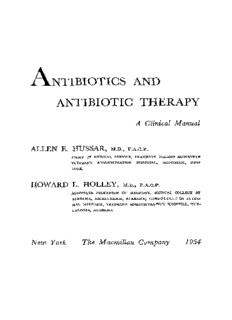
antibiotics and PDF
Preview antibiotics and
ANTIBIOTICS AND ANTIBIOTIC THERAPY A Clinical Manual ALLEN E. HUSSAR, M.D., F.A.C.P. ClIlEF OF MEDICAL SERVICE, FRANKLIN DELANO ROOSEVELT VI>TERANS ADMINISTRATION HOSPITAL, MONTROSE, NEW YORK HOWARD L. HOLLEY, M.D., F.A.C.P. ASSOCIATE PROFESSOR OF MEDICINE, MEDICAL COLLEGE OF ALABAMA, BIRMINGHAM, ALABAMA; CONSULTANT IN INTER N,\L MEDICINE, VETERANS ADMINISTRATION HOSPITAL, TUS C~LOOS~, ALABAMA New York The Macmillan Company 1954 ~.30·o0 B. J..~ ... ,kilian Veterinary Research Iastitute· Library. • 5 HU MUKTESWAR" CIass:7..ev.~u.Bu bl~ r 7.ff ~egiBter No. 6 () Room NCil. Inward No . Shelf No. It- .} .-tceived -!iII' Book NQ. l(GIPC-S4-3~ VR/f.i-l2-11.i6-iOO. ANTIBIOTICS AND ANTIBIOTIC THERAPY A Clinical Manual . .~ ..s 0 THE MACMILLAN COMPANY NEW YORK' CHICAGO DALLAS· ATLANTA· SAN FRANCISCO LONDON· MANILA THE MACMILLAN COMPANY OF CANADA. LIMITED TORONTO COPYRIGHT, 1954, lIY THE MACMILLAN COMPANY PUBLISHED SIMULTANEOUSLY IN CANADA. All rights reserved-no part of this book may be reproduced in any form without permission in writing from the pub lisher, except by a reviewer who wishes to quote brief pas sages in connection with a review written for inclusion in magazine or newspaper. First Printing, November, 1954. PRINTED IN THE UNITED STATES To H. L. H. and M. H. H. preface IT HAS now been a little more than a decade since penicillin was first made available for general use, yet in this brief span of time antibiotic therapy has advanced the practice of medicine farther than any other single factor of any of the previous centuries. Man, at last, is apparently winning his long and tumultuous battle against ipfectious organisms. Certainly not all the pages of this illustrious era have yet been recorded, but it seems timely to take stock of what has so far been accomplished. Since penicillin made its appearance, many new antibiotics have been introduced. A great amount of knowledge concerning their use, limitations, and mode of action has been acquired through ex tensive laboratory and clinical investigations. Today, manufac turers are engaged in producing these substances on a tremendous scale. Every physician, be he general practitioner or specialist, uses more antibiotics than any other drugs. Although we do not yet possess an effective agent against all known organisms, and certain limitations prevent any of the known antibiotics from being considered the ideal one, we are now able to effectively prevent infections and" successfully treat a great variety of infections, thus producing far-reaching effects upon the life span of man. The question arises, "Where do we go from here?" First of all, the search should continue for an ideal, omnipotent antibiotic, with no limitations as to its use. For the present, how ever, clinicians should strive to acquire skill in the usage of presently available agents so that they can be utilized with the utmost benefit vii
Description: